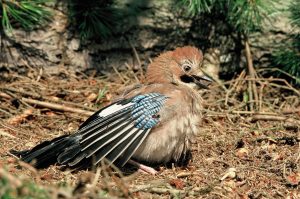Disease causes greenfinch population to fall
Which birds are affected?
Greenfinches are reported most frequently, but other finches and house sparrows are also susceptible to trichomonosis. Formerly, it was seen in pigeons and doves and some birds of prey. This is a disease found only in birds - it does not pose a threat to the health of humans, cats or dogs.
What happens?
The trichomonad parasite lives in the upper digestive tract of the bird, and its actions progressively block the bird’s throat, making it unable to swallow food. The bird dies from starvation.
Birds with the disease show signs of general illness, for example lethargy and fluffed-up plumage, but affected birds may also drool saliva, regurgitate food, have difficulty in swallowing or show laboured breathing.
Finches are frequently seen to have matted, wet plumage around the face and beak, and uneaten food in and around the beak. In some cases, swelling of the neck may be seen from a distance.
How is it passed on?
The trichomonad parasite is vulnerable to drying out and cannot survive for long periods outside the host. Transmission of infection between birds happens when they feed one another with regurgitated food during the breeding season, and through food or drinking water contaminated with recently regurgitated saliva.
What can I do?
If trichomonosis is suspected, it is recommended to temporarily stop putting out food, and leave bird baths dry until sick or dead birds are no longer found in the garden.
This is to discourage birds from congregating together, which may increase the potential for the disease to spread between individuals.
Wild birds can suffer from a variety of diseases from time to time. Good hygiene practice, specifically the regular cleaning of all feeders, bird baths and feeding surfaces, is an essential part of looking after garden birds and will help to lower the risk to birds of diseases in general.
No effective treatment can be administered to birds in the wild, because it is impossible to ensure that the infected individuals receive an adequate dose and that healthy birds do not pick up the medicine. Also, a positive confirmation of the disease is needed prior to starting any treatment, and this can usually only be obtained by a post mortem.


